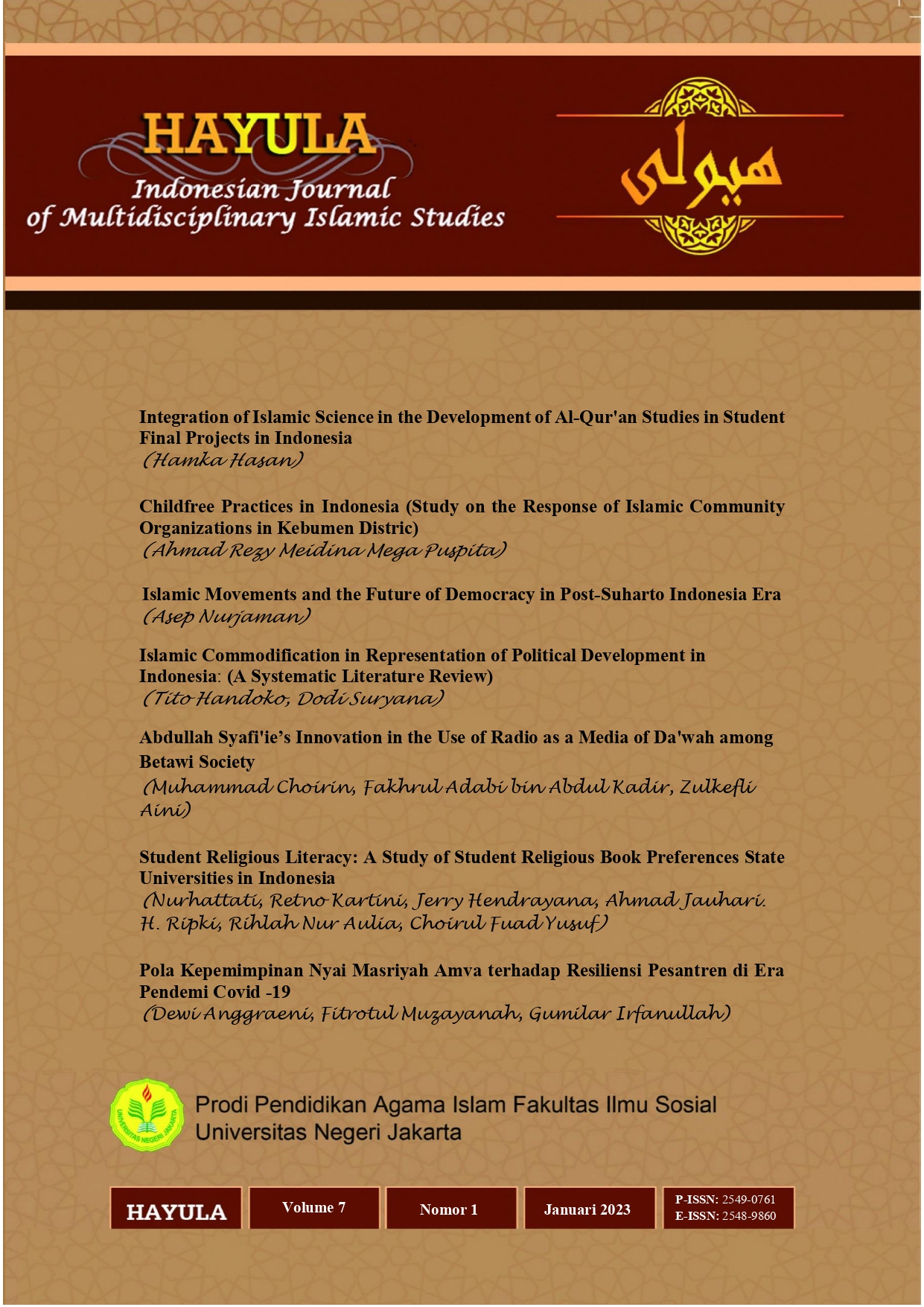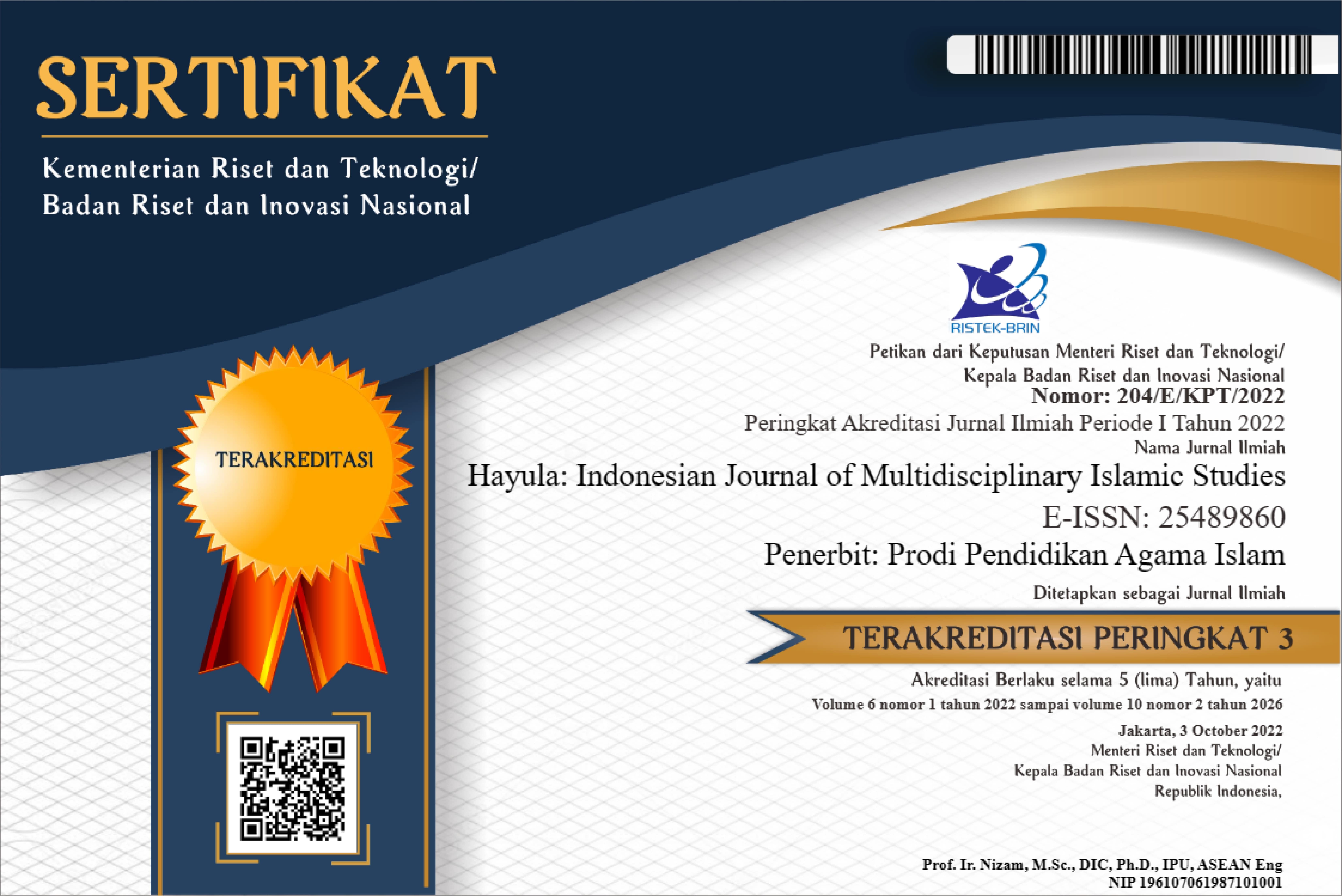Islamic Movements and the Future of Democracy in Post-Suharto Indonesia Era
DOI:
https://doi.org/10.21009/hayula.007.01.03Keywords:
Democracy, Fundamentalis, Islamic MovementAbstract
Since 1998, Indonesia, as the biggest Muslim country in the world, has transformed from an authoritarian to a democratic regime. However, violence and terrorism associated with the Islamic movement, especially the movement of political Islam, are considered to threaten the future of Indonesian democracy. The purpose of the study is to describe the Political Islam Movement and its impact on the post-Suharto democratic system. This study uses qualitative research methods with descriptive analysis research, while the data is obtained through literature review and document analysis. This study found that acts of violence and terrorism were carried out by fundamentalist Muslims who aspired to realize an Islamic state. However, these acts of violence and terrorism triggered the development of moderate Muslims. The consequences of the development of moderate Muslims are the changing of Muslim political behavior, starting from not participating in elections, changing political choices, and up to pragmatic politics. The political violence that has occurred has encouraged the development of Islamic moderation, thus harming Islamic parties because Muslim voters have diverted their political choices to the nationalist-religious parties.
References
Arumsari, N., & Rahayu, A. M. (2016). Book Review: King, Dwight Y. Half-Hearted Reform: Electoral Institutions and Struggle for Democracy in Indonesia. New York: Praeger, 2003. 256 PP. Politik Indonesia: Indonesian Political Science Review.
Baswedan, A. R. (2004a). Political Islam in Indonesia: Present and future trajectory. Asian Survey.
Baswedan, A. R. (2004b). Sirkulasi Suara dalam Pemilu 2004. Analisis CSIS, 33(2), 173–189.
Bruinessen, V. (2004). “Traditionalist” and “Islamist” Pesantren in Contemporary Indonesia. ISIM.
Buehler, M. (2009). Islam and democracy in Indonesia. Insight Turkey, 11(4), 51–63.
Christmann, K. (2012). Preventing religious radicalization and violent extremism: A systematic review of the research evidence. Youth Justice Board, 1–77.
Duile, T., & Bens, J. (2017). Indonesia and the “conflictual consensus”: a discursive perspective on Indonesian democracy. Critical Asian Studies, 49(2), 139–162.
Fionna, B. U., & Tomsa, D. (2017). Parties and Factions in Indonesia : The Effects of Historical Legacies and Institutional Engineering. ISEAS Working Paper.
Hakam, A., Anggraeni, D., & Fadhil, A. (2020). Pola dan Narasi Gerakan Keislaman di Universitas Negeri Jakarta. Hayula: Indonesian Journal of Multidisciplinary Islamic Studies, 4(2), 263-278.
Hakim, S. A. (2018). Islam and government: An analytical review on Khumayni’s Kashf al-Asrār and Wilāyat al-Fāqih. Indonesian Journal of Islam and Muslim Societies, 8(1), 147–171. ht
Hamayotsu, K. (2014). Conservative turn? Religion, state, and conflict in Indonesia. Pacific Affairs.
Hasan, N. (2020). The expansion of " salafis." In Laskar Jihad: Islam, Militancy, and the Quest for Identity in Post-New Order Indonesia. (pp. 1–33).
Hossain, A. A. (2016). Islamism, secularism and post-Islamism: the Muslim world and the case of Bangladesh. Asian Journal of Political Science, 24(2), 214–236.
Istadiyantha. (2019). Tracing the Path of Islamic Political Movements in Indonesia. Afkaruna, 15(1), 1–14.
Khamid, N. (2016). Bahaya Radikalisme terhadap NKRI. Millati: Journal of Islamic Studies and Humanities.
Kikue, H. (2011). The End of Political Islam? A Comparative Analysis of Religious Parties in the Muslim Democracy of Indonesia. Journal of Current Southeast Asian Affairs, 30(3), 133–159.
Kustana, T. (2017). Islamic terrorism in Indonesia: Addressing Government Strategies and Muslim Population. Jurnal Pertahanan, 3(2), 77.
Laisa, E. (2014). Islam dan radikalisme. Islamuna, 1(1), 1–18.
Maghfuri, A. (2019). Countering Conservative-Radical Understanding by Mainstreaming Moderat Islam and the Role of Educational Institution in Indonesia. International Journal on Islamic Educational Research (SKIJIER), 3(1), 1–14.
Menchik, J. (2019). Moderate Muslims and Democratic Breakdown in Indonesia. Asian Studies Review.
Mohajan, H. A. (2018). Qualitative Research Methodology in Social Sciences, and Related Subjects. Journal of Economic Development, Environment, and People, 7(01), 23–48.
Mujani, S., Liddle, R. W., Mujani, S., & Liddle, R. W. (2020). Public Opinion Indonesia’s Approaching Elections Politics, Islam, and Public Opinion, 15(1), 109–123.
Nurjaman, A., Suprapto, B., & Masmuh, A. (2018). Nationalist Vs Islamic: The dynamic of politik aliran in post-suharto Indonesia. Pertanika Journal of Social Sciences and Humanities, 26(3), 2009–2020.
Prajuli, W. (2018). Islamic Parties, Islamic Radicals, and Democratization in Indonesia, (May).
Robison, R., & Hadiz, V. R. (2017). Indonesia: a tale of misplaced expectations. Pacific Review, 30(6), 895–909.
Satria, A., Putri, P., Sari, N., & Adriana, R. (2018). The Current State of Terrorism in Indonesia : Vulnerable Groups, Networks, and Responses, 0–18.
Shalihin, N. (2017). Understanding The Radicalism Movement In Indonesia: A Conflict Approach to the Rise of Terrorism. AJIS: Academic Journal of Islamic Studies.
Shiraishi, T. (2020). Southeast Asia Approaching Suharto’s Indonesia from 5–7.
Shupe, A. (2009). Religious Fundamentalism. The Oxford Handbook of the Sociology of Religion, 127–153.
Tajuddin, A. (2016). Development, Democracy, and Post-Islamism in Indonesia. International Journal of Social Science Studies, 4(11), 41–50.
Trihartono, A., & Patriadi, H. B. (2016). The 2014 Indonesian general election and beyond: Melting “frozen” cleavages. Asian Journal of Comparative Politics, 1(1), 25–43.
Ufen, A. (2008). From aliran parties to dealignment: political in post-Suharto Indonesia. South East Asia Research, 16(1), 5–41.
Umam, F. (2019). Ideological Involution of the Islamists. ULUL ALBAB Jurnal Studi Islam, 20(1), 25–45.
Umar, A. R. M. (2010). Melacak Akar Radikalisme Islam di Indonesia. Jurnal Ilmu Sosial Dan Ilmu Politik.
Xiao, Y., & Watson, M. (2019). Guidance on Conducting a Systematic Literature Review. Journal of Planning Education and Research, 39(1), 93–112.
Downloads
Published
How to Cite
Issue
Section
License
Authors who publish with this Journal agree to the following terms:
- Author retain copyright and grant the journal right of first publication with the work simultaneously licensed under a creative commons attribution licensethat allow others to share the work within an acknowledgement of the work’s authorship and initial publication of this journal.
- Authors are able to enter into separate, additional contractual arrangementfor the non-exclusive distribution of the journal’s published version of the work (e.g. acknowledgement of its initial publication in this journal).
- Authors are permitted and encouraged to post their work online(e.g. in institutional repositories or on their websites) prior to and during the submission process, as it can lead to productive exchanges, as well as earlier and greater citation of published works.
Users/public use of this website will be licensed to CC BY







